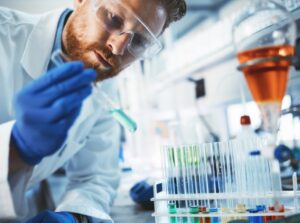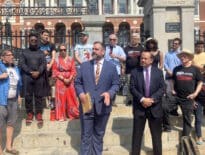Massachusetts life science industry is expanding into new submarkets and creating fast-growing job clusters from Boston to Worcester despite a more challenging funding climate.
Venture capital funding dipped 30 percent from the previous year to $3.7 billion in the first half of 2023, but Massachusetts’ leading share of the national VC pipeline increased to 32 percent, up from 26 percent in 2022.
Companies outside of Cambridge received 55 percent of all VC funding, led by Boston, Waltham and Watertown.
“The industry in the Commonwealth is regionalizing and diversifying,” MassBio CEO Kendalle Burlin O’Connell said in a statement accompanying the industry organization’s annual Industry Snapshot report. “While seed fundings may be down, homegrown companies are still seeing their science funded in series A [rounds] and beyond and doing so in many cases outside Boston and Cambridge.”
The industry generated $21.8 billion in wages at average annual salaries of $191,146. The job pool rose nearly 7 percent to 113,994.
The past decade’s life science development boom has created a 62-million-square-foot lab and biomanufacturing inventory in Massachusetts, including 6 million square feet completed in 2022.
The industry has generated a consistent source of demand for high-rent commercial space since 2020, in contrast to a sharp decline in office leasing.
But the market is expected to grow at a more moderate pace following the recent decline in VC funding in the higher-interest rate climate. MassBIO estimates the current development pipeline at 14 to 17 million square feet through the end of 2025.
With limited development sites remaining in Cambridge, the industry has been a key driver of activity in Boston neighborhoods including the Seaport District, Fenway and Allston-Brighton in recent years. Suffolk County’s 16-million-square-foot inventory trails only Middlesex County’s 42 million-square-foot portfolio, which includes the Cambridge industry hub.
Middlesex County’s 9.5 million-square-foot development pipeline is the statewide leader, followed by 4.4 million square feet in Suffolk County.
Central Massachusetts’ emergence as an industry cluster includes the 700,000-square-foot Pathways campus being developed by King Street Properties at the Devens business park. In 2022, the state Legislature lifted a longstanding cap on commercial development at Devens, paving the way for a potential 3.5 million square feet of additional development.
The 46-acre former Worcester State Hospital property is being redeveloped by Worcester Business Development Corp. as biomanufacturing campus including space leased to pharmaceutical manufacturer WuXi Biologics. Worcester County’s biomanufacturing workforce increased 18 percent, leading the state, while Suffolk County had the highest R&D job growth at 17 percent.
Editor’s note: This report has been updated with corrected data from MassBio about the size of the Worcester County development pipeline.









